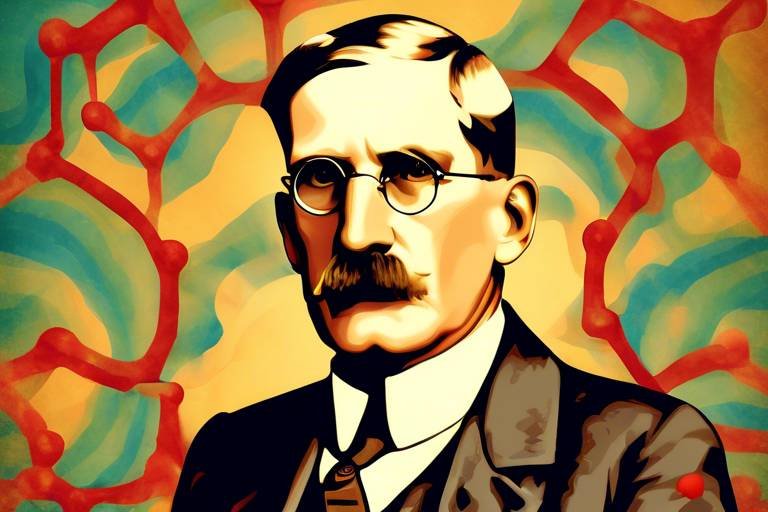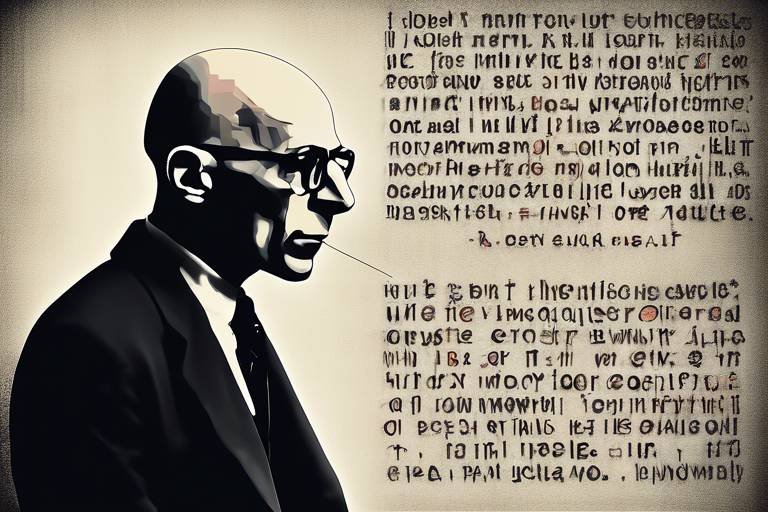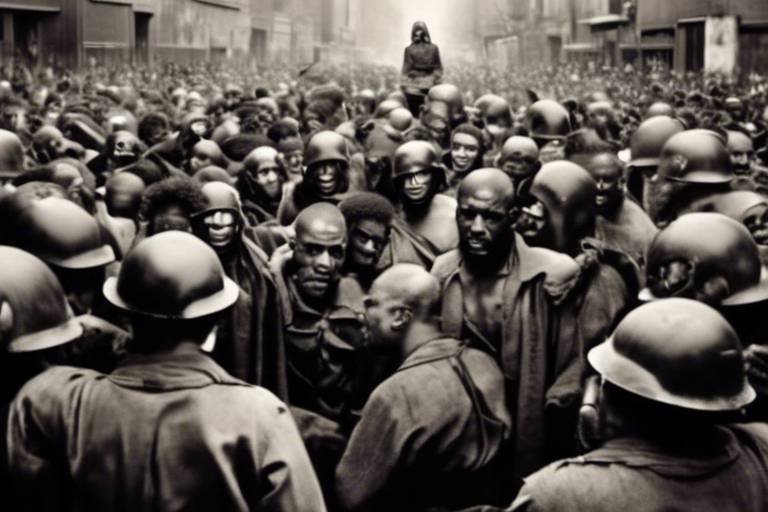The Philosophy of Ludwig Wittgenstein - A Primer
Ludwig Wittgenstein stands as a towering figure in 20th-century philosophy, and his ideas continue to spark curiosity and debate among scholars and enthusiasts alike. Born in Vienna in 1889, Wittgenstein's journey through philosophy was anything but conventional. He was not just a thinker; he was a revolutionary who challenged the very foundations of how we understand language, meaning, and reality. His work invites us to ponder profound questions: What is the relationship between language and the world? How do we derive meaning from our words? And ultimately, what can we truly know?
Wittgenstein's philosophical evolution can be broadly divided into two significant phases: his early work, encapsulated in the Tractatus Logico-Philosophicus, and his later contributions, particularly in the Philosophical Investigations. Each phase represents a distinct approach to the nature of language and thought, offering insights that resonate with anyone who has ever grappled with the complexities of communication.
In the Tractatus, Wittgenstein introduces his famous Picture Theory of Language, asserting that sentences function as pictures of states of affairs. This theory posits that language has a logical structure that mirrors the world, allowing us to represent facts through words. However, as he delves deeper, he recognizes the limits of language. He famously concludes that "whereof one cannot speak, thereof one must be silent," suggesting that some aspects of our experience elude verbal expression. This notion has profound implications, prompting us to reflect on the boundaries of our understanding.
As we transition to his later works, Wittgenstein shifts his focus from the rigid structures of language to the fluidity of everyday communication. He introduces the concept of language games, emphasizing that meaning is not fixed but rather determined by the context in which words are used. This perspective highlights the social nature of language, suggesting that our understanding is shaped by our interactions and the myriad forms of life we inhabit.
Wittgenstein's legacy is undeniable. His ideas have influenced various fields, from linguistics to cognitive science, and continue to inspire contemporary debates about the nature of thought and communication. By challenging us to rethink our assumptions about language, Wittgenstein invites us to explore the intricate tapestry of human experience, urging us to consider how our words shape our reality.
- What is the main focus of Wittgenstein's philosophy?
Wittgenstein's philosophy primarily revolves around the relationship between language and reality, exploring how language shapes our understanding of the world. - What is the Picture Theory of Language?
The Picture Theory posits that sentences can depict states of affairs, meaning that language has a logical structure that corresponds to the world. - How did Wittgenstein's views change over time?
Wittgenstein's early work focused on the logical structure of language, while his later work emphasized the contextual and social aspects of language use. - What are language games?
Language games are a concept introduced by Wittgenstein to illustrate that the meaning of words is determined by their use in various forms of life.

Wittgenstein's Early Life
Ludwig Wittgenstein, born on April 26, 1889, in Vienna, Austria, emerged from a family steeped in both wealth and culture. His upbringing was anything but ordinary, with his family being one of the richest in the Austro-Hungarian Empire. This privileged background provided him with access to a top-notch education and exposure to a variety of influential thinkers. Can you imagine growing up in a household where discussions about art, science, and philosophy were the norm? This environment undoubtedly played a crucial role in shaping his intellectual pursuits.
Wittgenstein's early education began at the prestigious Realgymnasium, where he excelled in subjects like mathematics and engineering. His fascination with engineering led him to the University of Manchester, where he studied mechanical engineering. However, it was during this time that he discovered his true passion for philosophy, particularly through his interest in the foundations of logic and language. Isn't it interesting how sometimes our paths can take unexpected turns, leading us to our true calling?
After completing his engineering studies, Wittgenstein's life took a significant turn when he moved to England. He became acquainted with the renowned philosopher Bertand Russell, who would later become a pivotal figure in his philosophical journey. Under Russell's mentorship, Wittgenstein delved deeper into the realms of logic and language, which ultimately laid the groundwork for his later works. Their relationship was not just that of a teacher and student; it was a dynamic exchange of ideas that would influence the course of 20th-century philosophy.
Wittgenstein's family life was also marked by tragedy. His father, Karl Wittgenstein, was a prominent industrialist, known for his strict and authoritarian demeanor. The philosophical discussions at home were often overshadowed by the family's complex dynamics, which included the mental health struggles of some of his siblings. This blend of privilege and personal turmoil likely contributed to Wittgenstein's deep reflections on the nature of reality and meaning.
Throughout his early life, Wittgenstein was not just a passive observer; he actively engaged in various intellectual circles. His time in Vienna exposed him to the vibrant cultural and philosophical movements of the time, including the works of Sigmund Freud and the Vienna Circle. These influences would later manifest in his writings, where he often grappled with the complexities of language and its relationship to the world. It's fascinating to think about how our surroundings and experiences shape our thoughts and beliefs, isn't it?
In summary, Wittgenstein's early life was a tapestry woven with threads of privilege, intellectual curiosity, and personal challenges. Each of these elements played a vital role in shaping his philosophical outlook. As he transitioned from engineering to philosophy, the influences of his upbringing and education would set the stage for the revolutionary ideas he would later present in his seminal works. His journey is a testament to the idea that our beginnings, no matter how complex, can lead to profound insights and contributions to the world.
- What was Wittgenstein's main focus in philosophy?
Wittgenstein primarily focused on the relationship between language, meaning, and reality. - How did his early life influence his philosophical ideas?
His privileged upbringing and exposure to diverse intellectual circles shaped his thoughts on language and logic. - Who were some key figures in Wittgenstein's life?
Notable figures included his father, Karl Wittgenstein, and philosopher Bertrand Russell.

The Tractatus Logico-Philosophicus
The Tractatus Logico-Philosophicus, often simply referred to as the Tractatus, is a groundbreaking work that marks a significant milestone in the landscape of 20th-century philosophy. Written by Ludwig Wittgenstein during World War I, this text serves as a philosophical manifesto that seeks to address the intricate relationship between language and reality. One of the most striking aspects of the Tractatus is its concise and structured format, which presents complex ideas in a series of numbered propositions. This organization not only reflects Wittgenstein's logical approach but also invites readers to engage deeply with his thoughts.
At its core, the Tractatus argues that language functions as a mirror of reality. Wittgenstein introduces the concept of the picture theory of language, which posits that sentences are essentially pictures of states of affairs. This means that the structure of a sentence can represent the structure of the world. For instance, consider the sentence "The cat is on the mat." Here, the arrangement of words corresponds to a specific arrangement of objects in reality. This relationship between language and the world is not just a casual observation; it forms the foundation of Wittgenstein's early philosophy, suggesting that our understanding of the world is inextricably linked to our use of language.
However, the Tractatus also delves into the limitations of language. Wittgenstein famously asserts that "whereof one cannot speak, thereof one must be silent." This statement encapsulates the idea that language has boundaries; it can only describe what can be logically represented. Anything beyond that—such as ethics, aesthetics, and metaphysics—falls outside the realm of meaningful discourse. This notion challenges readers to reflect on the implications of language and the extent of our knowledge, pushing the envelope of philosophical inquiry into the nature of reality itself.
Another significant contribution of the Tractatus is the idea of logical atomism. Wittgenstein suggests that the world consists of simple, indivisible facts, akin to atoms in a chemical structure. These facts combine in various ways to form complex propositions, much like atoms bond to create molecules. This perspective not only influences Wittgenstein's later thoughts but also lays the groundwork for subsequent developments in analytic philosophy. The interplay of language and reality, as depicted in the Tractatus, invites readers to reconsider their understanding of both.
In summary, the Tractatus Logico-Philosophicus is not merely a philosophical text; it is a profound exploration of the relationship between language, meaning, and the nature of reality. Wittgenstein's insights challenge us to rethink how we communicate and comprehend the world around us. As we navigate through the complexities of language, the Tractatus serves as a guiding light, illuminating the paths of thought that continue to influence contemporary philosophy.

Picture Theory of Language
The is one of the cornerstones of Ludwig Wittgenstein's early philosophical thought, particularly as articulated in his groundbreaking work, the Tractatus Logico-Philosophicus. At its core, this theory proposes that language functions as a kind of picture of reality, where words and sentences represent states of affairs in the world. Imagine a photograph capturing a moment in time; just as that image conveys information about what is happening, so too do sentences convey facts about the world. This analogy helps us grasp how Wittgenstein viewed the relationship between language and the world around us.
Wittgenstein's picture theory asserts that the structure of language mirrors the structure of reality. To illustrate this, he suggests that a meaningful sentence can be broken down into its components, much like how a picture can be analyzed into its parts. For instance, consider the simple statement, "The cat is on the mat." This sentence can be dissected into its elements: the subject (the cat), the predicate (is on), and the location (the mat). Each component corresponds to a specific part of the world, creating a logical structure that reflects reality. This is where we see the beauty of language: it serves as a bridge, connecting our thoughts with the external world.
However, Wittgenstein doesn't just stop at stating that language depicts reality; he also emphasizes the importance of logical structure and correspondence. He argues that for a sentence to be meaningful, it must have a clear relationship with the facts it describes. This leads us to the idea that language is not merely a collection of arbitrary symbols but rather a sophisticated system that conveys meaning through its logical organization. In this sense, language acts as a model of reality, allowing us to navigate and understand the complexities of the world.
Despite its strengths, the Picture Theory of Language also faces limitations. Wittgenstein was acutely aware that not all aspects of human experience can be captured through language. For instance, emotions, sensations, and subjective experiences often elude precise verbal expression. This realization led him to conclude that there are boundaries to what language can convey, encapsulated in his famous assertion that “whereof one cannot speak, thereof one must be silent.” This profound insight paved the way for later philosophical inquiries into the nature of language and meaning, prompting thinkers to explore the nuances that extend beyond mere representation.
In summary, the Picture Theory of Language is a fascinating exploration of how language relates to reality. It highlights the intricate relationship between words and the world, shedding light on the logical structures that underpin our communication. While it offers a compelling framework for understanding meaning, it also challenges us to consider the limitations of language and the rich tapestry of human experience that lies beyond words.
- What is the Picture Theory of Language?
The Picture Theory of Language posits that sentences function as pictures of states of affairs, representing facts about the world through their logical structure. - How does Wittgenstein's theory relate to reality?
Wittgenstein argues that the structure of language mirrors the structure of reality, allowing us to understand and communicate about the world effectively. - What are the limitations of the Picture Theory?
While the theory provides a framework for understanding meaning, it acknowledges that not all human experiences can be adequately expressed through language.

Limits of Language
The concept of the is one of the most profound ideas presented by Ludwig Wittgenstein in his groundbreaking work, the Tractatus Logico-Philosophicus. Wittgenstein boldly asserts that language is not just a tool for communication but also a framework that shapes our understanding of the world. He famously concludes that "whereof one cannot speak, thereof one must be silent." This statement encapsulates the essence of his argument: there are boundaries to what can be meaningfully expressed through language.
To grasp the significance of these limits, one must consider how language operates in relation to reality. Wittgenstein suggests that language can only depict facts about the world. For example, we can describe the weather, share our thoughts, or express emotions, but the moment we venture into the realm of the metaphysical or the abstract, we encounter the limitations of our linguistic constructs. In essence, language can only capture a fraction of our experiences and thoughts, leaving vast territories of human existence uncharted.
This limitation is not merely a philosophical musing; it has real implications for how we communicate and understand one another. When we attempt to discuss concepts that lie outside the realm of language—such as the ineffable nature of beauty or the essence of existence—we find ourselves at a loss. Wittgenstein's view encourages us to recognize that some experiences are inherently beyond the grasp of words, prompting us to seek alternative forms of expression, such as art or music, to convey what language cannot.
Wittgenstein's exploration of the limits of language also leads to a deeper inquiry into the nature of meaning. He argues that meaning is not an intrinsic property of words but arises from their use in specific contexts. This perspective invites us to examine how language functions in our everyday lives and how our understanding is shaped by the shared practices and norms of our communities. For instance, consider the following:
- In a scientific context, the term "force" has a specific definition that differs from its everyday usage.
- In a legal setting, the word "contract" carries implications that are crucial for binding agreements.
- Conversely, in poetry, the same word might evoke emotions and imagery that transcend its literal meaning.
By recognizing these contextual variations, we begin to appreciate the fluidity of language and the constraints that come with it. Wittgenstein’s insights reveal that while language is a powerful tool for communication, it is also a limiting factor in our quest for knowledge and understanding. This realization prompts a sense of humility, reminding us that our expressions, no matter how eloquent, can only approximate the richness of human experience.
Ultimately, Wittgenstein's exploration of the limits of language serves as a reminder that while we strive to articulate our thoughts and feelings, we must also acknowledge the inherent boundaries of our linguistic capabilities. It challenges us to embrace the complexity of human experience and to explore alternative modes of understanding that lie beyond the confines of words.
Q: What does Wittgenstein mean by "the limits of language"?
A: Wittgenstein argues that language can only express certain aspects of reality, and there are areas, particularly in the metaphysical realm, that cannot be adequately captured by words.
Q: How does this concept affect our daily communication?
A: It reminds us that language has its limitations; some experiences or emotions may be better expressed through art, music, or other forms of non-verbal communication.
Q: What are the implications of these limits for philosophy?
A: The limits of language challenge philosophers to consider how meaning is constructed and understood, emphasizing the importance of context in interpreting language.

Logical Atomism
Wittgenstein's concept of is a fascinating lens through which we can view the world and its complexities. At its core, logical atomism posits that the world is made up of simple, indivisible facts. These facts are the building blocks of reality, akin to atoms in a physical substance. Just as atoms combine in various ways to form different materials, these simple facts can be combined to create the complex tapestry of our experiences. This idea suggests that, to understand the structure of reality, we must first dissect it into these fundamental elements.
Imagine you’re building a house. Before you can erect the walls or put on the roof, you need to lay a solid foundation. For Wittgenstein, these foundational facts are the essence of meaning. Each fact corresponds to a specific state of affairs in the world, and language serves as the tool to depict these relationships. In his view, sentences are not just strings of words; they are representations of these facts, much like a blueprint illustrates the design of a building.
However, Wittgenstein doesn't stop there. He introduces a significant implication of logical atomism: the idea that the limits of our language reflect the limits of our world. If we cannot articulate a thought or a state of affairs, it suggests that it cannot be meaningfully considered within our understanding of reality. This perspective leads to the poignant conclusion that there are aspects of existence that lie beyond the reach of language. As Wittgenstein famously stated, “Whereof one cannot speak, thereof one must be silent.” This notion challenges us to reconsider the boundaries of our communication and the very nature of our inquiries into the universe.
To better illustrate this concept, consider the following table that summarizes the key aspects of logical atomism:
| Aspect | Description |
|---|---|
| Simple Facts | The fundamental, indivisible components of reality. |
| Language as Representation | Language depicts facts about the world, functioning like a blueprint. |
| Limits of Language | What cannot be spoken about cannot be meaningfully considered. |
This framework not only provides a robust foundation for understanding language and reality but also lays the groundwork for Wittgenstein's later philosophical explorations. He transitions from this early view to a more nuanced understanding of how language operates in everyday contexts, leading to his later works that emphasize the role of social practices in shaping meaning.
In essence, logical atomism invites us to dissect our understanding of the world into manageable parts, yet it also humbles us by reminding us of the limitations of our language. It encourages us to think critically about how we communicate and the implications of our words in the broader context of reality.
- What is logical atomism? Logical atomism is the philosophical view that the world consists of simple, indivisible facts that can be expressed through language.
- How does Wittgenstein relate language to reality? Wittgenstein argues that language functions as a representation of facts about the world, and understanding these relationships is crucial for grasping reality.
- What are the implications of the limits of language? Wittgenstein suggests that if something cannot be articulated through language, it cannot be meaningfully considered within our understanding of the world.

Later Philosophy: Philosophical Investigations
In his later work, particularly in Philosophical Investigations, Ludwig Wittgenstein underwent a remarkable transformation in his approach to philosophy. Unlike his earlier focus on the logical structure of language as depicted in the Tractatus Logico-Philosophicus, he shifted his attention to the everyday use of language. This change was not merely a shift in focus but a profound rethinking of how we understand meaning and communication. Wittgenstein argued that meaning is not something inherent in words themselves; rather, it is shaped by their use within specific contexts. This perspective challenges the traditional views that sought to define meaning in abstract terms, suggesting instead that language is a dynamic, living entity.
Wittgenstein introduced the concept of language games to illustrate this idea. He likened the use of language to a game, where the rules are defined not by rigid structures but by the practices and forms of life of the speakers. Just as the rules of a game can vary depending on the context, so too can the meanings of words. This perspective invites us to consider how language functions in various social interactions and highlights the importance of context in understanding meaning. By emphasizing the fluidity of language, Wittgenstein opened the door to a more nuanced exploration of how we communicate, shifting the focus from a search for definitive meanings to an appreciation of the diverse ways language can be employed.
Moreover, Wittgenstein's exploration of rule-following plays a crucial role in this later philosophy. He posits that understanding language involves adhering to communal norms and practices. This notion suggests that our grasp of meaning is not solely an individual endeavor but is deeply rooted in the social fabric of our interactions. In essence, to understand a word is to understand how to use it within the context of shared practices. This insight has profound implications for various fields, including linguistics, psychology, and even artificial intelligence, as it encourages us to consider how meaning is negotiated and constructed through social engagement.
| Key Concepts | Description |
|---|---|
| Language Games | Language is understood through its use in various contexts, similar to how games have different rules. |
| Rule-Following | Understanding language involves adhering to communal norms, shaping our interpretation of words. |
| Contextual Meaning | Meaning arises from the context in which words are used, rather than from fixed definitions. |
Wittgenstein's later philosophy urges us to reconsider our assumptions about language and meaning. It challenges us to ask questions like, "How do we come to understand each other?" and "What role does context play in our communication?" By doing so, he not only reshaped the landscape of philosophy but also provided tools for grappling with the complexities of human interaction. His work continues to inspire philosophers, linguists, and thinkers across disciplines, as it invites us to delve deeper into the intricate web of language and its profound impact on our understanding of reality.
- What is the main focus of Wittgenstein's later philosophy?
Wittgenstein's later philosophy primarily focuses on the use of language in everyday contexts, emphasizing that meaning arises from how words are used rather than from fixed definitions.
- What are language games?
Language games are a concept introduced by Wittgenstein to illustrate that the meaning of words is determined by their use in various forms of life, much like the rules of different games.
- How does rule-following relate to understanding language?
Rule-following refers to the idea that our understanding of language is shaped by communal norms and practices, suggesting that meaning is negotiated through social interactions.

Language Games
Ludwig Wittgenstein's concept of represents a revolutionary shift in how we understand meaning and communication. Rather than viewing language as a rigid system of rules, Wittgenstein proposed that words gain their significance through their use in various contexts. Imagine a game of chess: the pieces, the rules, and the strategies all contribute to the game's meaning. Similarly, in the realm of language, the meaning of a word is not fixed but is instead shaped by the contexts in which it is played. This perspective invites us to consider how language operates in our daily lives, revealing the intricate dance between words and their meanings.
Wittgenstein famously stated, "The meaning of a word is its use in the language." This simple yet profound assertion challenges the traditional notion that words have inherent meanings. Instead, he encourages us to think of words as tools that we wield in various situations. For instance, consider the word "game" itself. Depending on the context, it could refer to a sports match, a playful activity, or even a strategic endeavor. Each usage reflects a different aspect of our human experience, emphasizing that meaning is not a solitary entity but rather a product of social interaction.
To illustrate this idea further, let's break down the concept of language games into a few key components:
- Contextual Use: Words derive their meaning from the situations in which they are employed. For example, the word "bank" can signify a financial institution or the side of a river, depending on the context.
- Social Interaction: Language is inherently social. Our understanding of words is shaped by our interactions with others, much like learning the rules of a game from fellow players.
- Fluidity of Meaning: Just as games can evolve over time with new rules and strategies, the meanings of words can shift based on cultural changes and societal norms.
In essence, Wittgenstein's language games highlight the dynamic nature of communication. They suggest that to truly grasp the meaning of a word, one must consider the context, the participants, and the purpose behind its use. This perspective not only enriches our understanding of language but also opens the door to deeper discussions about how we connect with one another. It leads us to ponder: how often do we misinterpret others simply because we fail to recognize the context in which they are speaking?
Moreover, Wittgenstein's approach encourages us to embrace the complexity of language. Just as no two games are played the same way, no two conversations unfold identically. The richness of human interaction lies in its variability, and this is where the beauty of language truly shines. By acknowledging the myriad of language games, we can appreciate the nuances of communication, fostering greater empathy and understanding in our interactions.
Ultimately, Wittgenstein's exploration of language games serves as a reminder that language is not merely a tool for conveying information; it is a living, breathing entity that evolves with us. As we navigate the intricate web of human relationships, let us remain mindful of the contexts that shape our words and the meanings they carry. In doing so, we not only enhance our own understanding but also enrich the conversations we share with others.

Rule-Following
The concept of is central to understanding Ludwig Wittgenstein's later philosophy, particularly in his work "Philosophical Investigations." At its core, rule-following addresses how we understand and apply rules in language and life. Wittgenstein challenges the traditional notion that rules exist independently of their application. Instead, he suggests that rules gain meaning through their use within specific contexts, much like a game where the rules are shaped by the players’ interactions. Have you ever played a game where the rules seemed to change based on how players interpreted them? This is similar to what Wittgenstein is getting at; the meaning of a word or rule can shift depending on the communal norms and practices of the language users.
Wittgenstein famously uses the example of a child learning to count. When a child is taught to say "one, two, three," they are not just memorizing a sequence of sounds; they are learning to follow a rule that has significance in a particular context. This leads us to the realization that understanding language involves more than just knowing definitions—it's about grasping how words are used in various forms of life. This idea emphasizes that language is not a rigid system of rules, but rather a dynamic and fluid practice shaped by social interactions.
To illustrate this further, Wittgenstein introduces the notion of a language game, where the meaning of words is determined by their function in specific activities. For example, consider the word "game" itself. It can refer to a board game, a sport, or even a playful interaction. The meaning shifts based on the context in which it is used. In this sense, rules are not merely instructions to be followed; they are alive and evolve as we engage with them. The act of following a rule becomes a communal practice, where understanding is built through shared experiences and agreements.
Wittgenstein's exploration of rule-following also raises intriguing questions about interpretation and meaning. If rules are inherently tied to our communal practices, how do we navigate situations where interpretations diverge? This is where the social aspect of language becomes crucial. Our understanding of rules is influenced by the community we belong to, making communication a collaborative effort. Just like in a dance, where each partner must be attuned to the other's movements, language requires a shared understanding to function effectively.
In summary, Wittgenstein’s insights into rule-following challenge us to reconsider how we think about language and meaning. Rather than viewing rules as fixed guidelines, he invites us to see them as living practices shaped by our interactions. This perspective not only enriches our understanding of language but also highlights the intricate connections between communication, community, and the very fabric of our social lives.
- What is rule-following in Wittgenstein's philosophy?
Rule-following refers to the way in which individuals understand and apply rules within the context of language and social practices, emphasizing the communal aspect of meaning. - How does Wittgenstein's view on language differ from traditional views?
Wittgenstein argues that meaning arises from the use of language in specific contexts rather than from fixed definitions, challenging the idea that language is a rigid system. - What are language games?
Language games are activities in which words are used, highlighting that the meaning of words is determined by their function within those activities.

Wittgenstein's Legacy
Ludwig Wittgenstein's influence on contemporary philosophy is nothing short of monumental. His ideas have reverberated through various fields, including linguistics, cognitive science, and even art. The way he approached the intricacies of language and meaning has sparked countless debates and discussions, making him a pivotal figure in 20th-century thought. Many philosophers and scholars find themselves grappling with his concepts, which continue to challenge and inspire new generations of thinkers.
One of the key areas where Wittgenstein's impact is profoundly felt is in the realm of language philosophy. His shift from the rigid structures of the early Tractatus to the more fluid and context-driven approach in the Philosophical Investigations has reshaped our understanding of meaning. He famously argued that "meaning is use," suggesting that the context in which a word is used is crucial to its interpretation. This idea has led to a greater appreciation for ordinary language and the everyday practices that shape our understanding of the world.
Moreover, Wittgenstein's concept of language games has opened up new avenues for exploring how language functions within various social contexts. By likening language to a game, he emphasizes the importance of communal norms and practices in shaping our linguistic interactions. This perspective has encouraged philosophers to delve deeper into the social dimensions of language, examining how cultural and situational factors influence communication.
Wittgenstein's legacy extends beyond philosophy into the realms of psychology and cognitive science. His ideas about the nature of thought and its relationship with language have sparked discussions about how we understand consciousness and cognition. For instance, the implications of his work on rule-following and meaning have led to inquiries into how we learn language and how it shapes our perception of reality.
To illustrate the far-reaching implications of Wittgenstein's work, consider the following table that summarizes some key areas influenced by his philosophy:
| Field | Influence |
|---|---|
| Philosophy | Re-evaluation of language and meaning |
| Linguistics | Contextual understanding of language use |
| Cognitive Science | Exploration of thought processes and language acquisition |
| Psychology | Understanding of social interactions and norms |
| Literary Theory | Interpretation of texts through the lens of language games |
In addition to these fields, Wittgenstein's work has also influenced ethics and political philosophy. His ideas challenge us to reconsider how language shapes our moral and ethical frameworks. By understanding that language is not merely a tool for communication but a dynamic part of our social lives, we can better grasp the complexities of ethical discourse and political rhetoric.
Ultimately, Wittgenstein's legacy is a testament to the power of language and its profound effects on thought, culture, and society. His work invites us to continually question our assumptions and engage with the world around us in a more nuanced way. As we explore the implications of his ideas, we are reminded that philosophy is not a static field but a living, breathing conversation that evolves with each new generation of thinkers.
- What is Wittgenstein's main contribution to philosophy?
Wittgenstein's primary contribution lies in his exploration of language and its relationship to reality, particularly through his works, the Tractatus and Philosophical Investigations. - How did Wittgenstein change the perception of language?
He shifted the focus from an abstract, logical structure of language to a more practical, use-based understanding, emphasizing context and social practices. - What are language games?
Language games refer to the idea that the meaning of words is determined by their use in specific contexts and social interactions. - Why is Wittgenstein still relevant today?
His thoughts on language, meaning, and social interaction continue to influence contemporary discussions in various fields, including philosophy, linguistics, and cognitive science.
Frequently Asked Questions
- Who was Ludwig Wittgenstein?
Ludwig Wittgenstein was a significant philosopher of the 20th century, known for his work in the philosophy of language and mind. His ideas have shaped modern philosophical thought, particularly regarding the relationship between language and reality.
- What is the main idea of the Tractatus Logico-Philosophicus?
The Tractatus presents the idea that language functions to depict facts about the world. Wittgenstein argues that sentences can be thought of as pictures of states of affairs, emphasizing a logical structure that corresponds to reality.
- What is the picture theory of language?
The picture theory posits that language mirrors reality. According to Wittgenstein, sentences represent facts in the world, functioning as pictures that convey meaning through their logical arrangement.
- What does Wittgenstein mean by the limits of language?
Wittgenstein suggests that language has boundaries, and anything beyond those limits cannot be adequately expressed in words. This leads to the famous conclusion that what cannot be said should be passed over in silence.
- Can you explain logical atomism?
Logical atomism is the view that the world consists of simple, indivisible facts. Wittgenstein believed that understanding the structure of language helps us grasp the fundamental nature of reality, which is built upon these atomic facts.
- What shift occurs in Wittgenstein's later philosophy?
In his later work, particularly in the Philosophical Investigations, Wittgenstein shifts focus from abstract language theories to everyday language use. He argues that meaning is derived from context and social interactions rather than fixed definitions.
- What are language games?
Language games are a concept introduced by Wittgenstein to illustrate how the meaning of words is determined by their usage in various contexts. This idea highlights the social aspect of language and how it functions in different life forms.
- What is the importance of rule-following in Wittgenstein's philosophy?
Rule-following is crucial in understanding how we interpret and apply language. Wittgenstein emphasizes that our understanding of language is shaped by communal norms and practices, which guide our interactions and interpretations.
- How has Wittgenstein influenced contemporary philosophy?
Wittgenstein's work continues to resonate in contemporary discussions about language, mind, and epistemology. His insights prompt ongoing debates regarding the nature of thought, communication, and the complexities of human understanding.



















